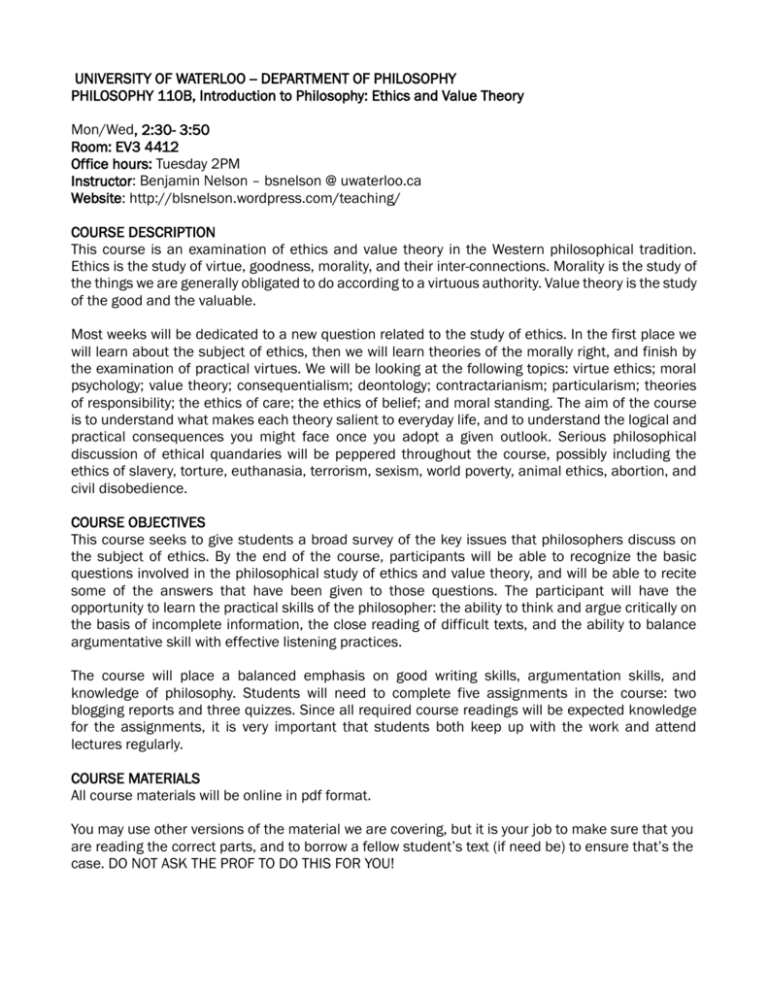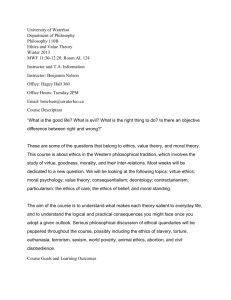Syllabus - WordPress.com
advertisement

UNIVERSITY OF WATERLOO -- DEPARTMENT OF PHILOSOPHY PHILOSOPHY 110B, Introduction to Philosophy: Ethics and Value Theory Mon/Wed, 2:30- 3:50 Room: EV3 4412 Office hours: Tuesday 2PM Instructor: Benjamin Nelson – bsnelson @ uwaterloo.ca Website: http://blsnelson.wordpress.com/teaching/ COURSE DESCRIPTION This course is an examination of ethics and value theory in the Western philosophical tradition. Ethics is the study of virtue, goodness, morality, and their inter-connections. Morality is the study of the things we are generally obligated to do according to a virtuous authority. Value theory is the study of the good and the valuable. Most weeks will be dedicated to a new question related to the study of ethics. In the first place we will learn about the subject of ethics, then we will learn theories of the morally right, and finish by the examination of practical virtues. We will be looking at the following topics: virtue ethics; moral psychology; value theory; consequentialism; deontology; contractarianism; particularism; theories of responsibility; the ethics of care; the ethics of belief; and moral standing. The aim of the course is to understand what makes each theory salient to everyday life, and to understand the logical and practical consequences you might face once you adopt a given outlook. Serious philosophical discussion of ethical quandaries will be peppered throughout the course, possibly including the ethics of slavery, torture, euthanasia, terrorism, sexism, world poverty, animal ethics, abortion, and civil disobedience. COURSE OBJECTIVES This course seeks to give students a broad survey of the key issues that philosophers discuss on the subject of ethics. By the end of the course, participants will be able to recognize the basic questions involved in the philosophical study of ethics and value theory, and will be able to recite some of the answers that have been given to those questions. The participant will have the opportunity to learn the practical skills of the philosopher: the ability to think and argue critically on the basis of incomplete information, the close reading of difficult texts, and the ability to balance argumentative skill with effective listening practices. The course will place a balanced emphasis on good writing skills, argumentation skills, and knowledge of philosophy. Students will need to complete five assignments in the course: two blogging reports and three quizzes. Since all required course readings will be expected knowledge for the assignments, it is very important that students both keep up with the work and attend lectures regularly. COURSE MATERIALS All course materials will be online in pdf format. You may use other versions of the material we are covering, but it is your job to make sure that you are reading the correct parts, and to borrow a fellow student’s text (if need be) to ensure that’s the case. DO NOT ASK THE PROF TO DO THIS FOR YOU! Additional readings not from the text are flagged (*) and will be made available as links on this syllabus in the Reading Schedule section below. iClicker: This course will take advantage of iClicker technology. Students must have an iClicker and bring it to class in order to receive 5% participation grade. Please note that impersonation (i.e., using absent friend’s device to record their answers) is a serious infraction and can result in a suspension penalty. COURSE REQUIREMENTS & DUE DATES Length Quiz 1 NA Blogging Report 1 1-2 pages (maximum 1500 words) Quiz 2 NA Blogging Report 2 1-2 pages (maximum 1500 words) Quiz 3 NA Reader Reply (x8) 1-2 paragraphs iClicker (x12) NA Due Date Week 3 Week 5 Value 10% 15% Week 7 Week 9 15% 20% Week 11 Throughout course Throughout course 25% 10% 5% We will go over (in brief) the ins and outs of the blog reports in the first lecture, and in more detail as we go along for the term. You will be given plenty of warning, and lots of guidance, on how to complete the assignments for this class. All assignments are due at the beginning of lecture on the indicated due dates. Late submissions will be penalized 10% PER DAY (including weekends). Students submitting late work must send Prof. Nelson an e-mail with the submission as an attachment (functioning as a “time stamp”), and coordinate with him the submission of the paper copy of the assignment. LEARN (COURSE WEBSITE) LEARN is the main mode of communication for this course after lecture and e-mail. Prof. Nelson will be posting notes, announcements, any possible changes to the reading schedule, and grades via LEARN. In addition, quizzes will take place over LEARN. Students may also use the Discussion Boards to ask questions about the readings or the assignments, and to coordinate study groups, etc. Because the LEARN site is so important, students are strongly encouraged to regularly access the site so as not to fall behind. Tentative schedule (subject to change): Week # Topics 1 Introduction to Ethics & Philosophy The subject of ethics Assignments Readings None 2 Virtue Plato: The Republic (Thrasymachus) (p.25-37) What does it mean to be a virtuous person? What is morality, apart from the rule of the strongest? 3 Ethical egoism Aristotle: Nicomachean Ethics (p. 3-5, 24-30) QUIZ 1 Is morality altruistic or egoistic? 4 Ethical egoism, part 2 5 Value theory BLOG 1 What is the good? Plato: The Republic (Glaucon & Adaimantus) (p. 4858) Rand: Virtue of Selfishness (“…Emergencies”, p.39-45) Bentham: Chapter 4 (p.31-34) Mill: Hedonism (p.914; p.35-41) Nozick: Antihedonism (all) Ross: Pluralism (all) Moral theory 6 Consequentialism Consequentialism: the right is whatever brings about the good 7 Rules and integrity QUIZ 2 Integrity: the right is a function of our core projects 8 Deontology Deontology: the right is an action that comes about through the rational good will 9 Practical rationality BLOG 2 Particularism: the right depends on the demands of the context 10 Ethics of care Oppression and justice Ross: Prime Facie Duties Little Noddings Singer The role of caring and sympathy in ethical theory 11 Bentham: Chapter 1 (p.14-18) Mill: Utilitarianism (p. 14-15, 19-27) Hare: On Slavery (p.220) Hooker: Rule vs. Act Utilitarianism Williams: Integrity Frankfurt: volitional necessities Thomson: Trolley Kant: Deontology Foot: Abortion QUIZ 3 Frye Rawls Contract theory: The right is what rational people would agree to in the right circumstances 12 Moral Care standing Non-standard cases and moral sympathy Kant Noddings (p.699-712) Singer Baier (p.721-8) Frye (p.729-34) THE WRITING CENTRE There is a Writing Centre on campus that offers help to students who want to improve their writing skills: http://elpp.uwaterloo.ca/writingcentre.html NOTE FOR STUDENTS WITH DISABILITIES The Office for Persons with Disabilities (OPD), located in Needles Hall, Room 1132, collaborates with all academic departments to arrange appropriate accommodations for students with disabilities without compromising the academic integrity of the curriculum. If you require academic accommodations to lessen the impact of your disability, please register with the OPD at the beginning of each academic term. CROSS-LISTED COURSE Please note that a cross-listed course will count in all respective averages no matter under which rubric it has been taken. For example, a PHIL/PSCI cross-list will count in a Philosophy major average, even if the course was taken under the Political Science rubric. ACADEMIC INTEGRITY Academic Integrity: In order to maintain a culture of academic integrity, members of the University of Waterloo are expected to promote honesty, trust, fairness, respect and responsibility. Discipline: A student is expected to know what constitutes academic integrity, to avoid committing academic offences, and to take responsibility for his/her actions. A student who is unsure whether an action constitutes an offence, or who needs help in learning how to avoid offences (e.g., plagiarism, cheating) or about “rules” for group work/collaboration should seek guidance from the course professor, academic advisor, or the Undergraduate Associate Dean. When misconduct has been found to have occurred, disciplinary penalties will be imposed under Policy 71 – Student Discipline. For information on categories of offenses and types of penalties, students should refer to Policy 71 - Student Discipline, http://www.adm.uwaterloo.ca/infosec/Policies/policy71.htm . Grievance: A student who believes that a decision affecting some aspect of his/her university life has been unfair or unreasonable may have grounds for initiating a grievance. Read Policy 70 Student Petitions and Grievances, Section 4, http://www.adm.uwaterloo.ca/infosec/Policies/policy70.htm . Appeals: A student may appeal the finding and/or penalty in a decision made under Policy 70 Student Petitions and Grievances (other than regarding a petition) or Policy 71 - Student Discipline if a ground for an appeal can be established. Read Policy 72 - Student Appeals, http://www.adm.uwaterloo.ca/infosec/Policies/policy72.htm . Academic Integrity website (Arts): http://arts.uwaterloo.ca/arts/ugrad/academic_responsibility.html Academic Integrity Office (uWaterloo): http://uwaterloo.ca/academicintegrity/








